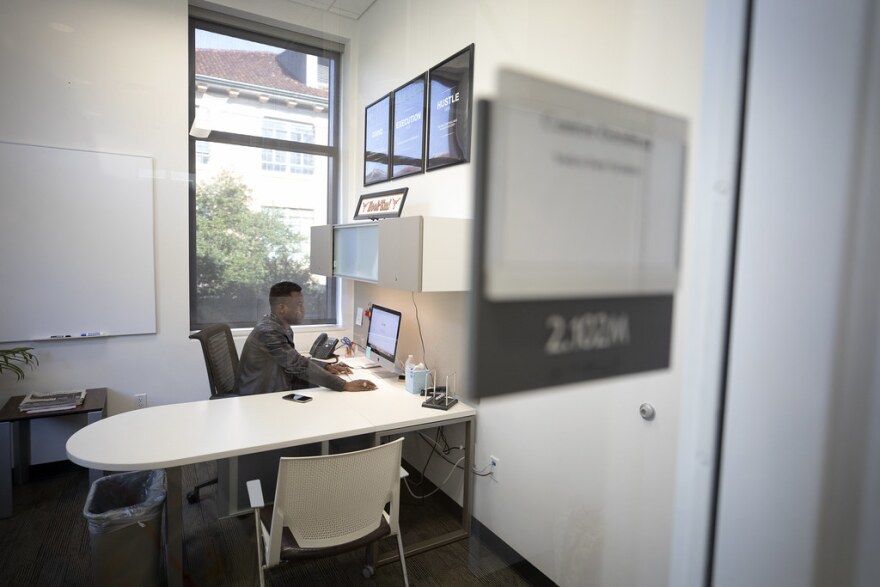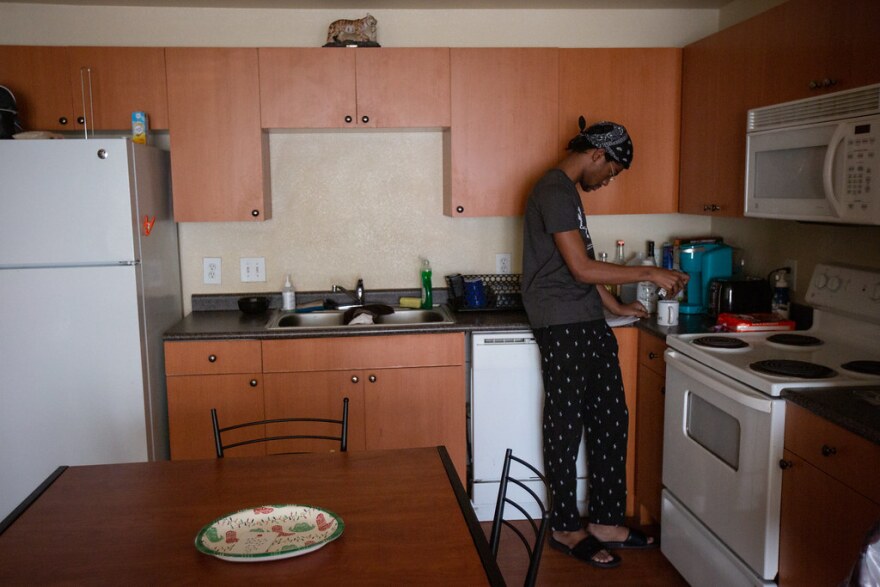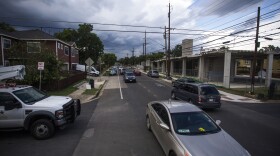Malik Julien has a bedroom and bathroom all to himself. But that’s not what sold him on his apartment in the East Riverside neighborhood.
“What was really attractive was the price,” said Julien, a sophomore at UT Austin. He pays $545 for his share of the four-bedroom, four-bathroom apartment at Town Lake Apartments. “This is probably the cheapest apartments for students that I know of.”
But in a few years, Julien’s apartment building, along with four others, will be demolished. Austin City Council members voted in October to rezone the land they sit on just south of Lady Bird Lake so owners can build new office, commercial and residential space. The project, which has been dubbed the "Domain on Riverside," will have roughly 4,700 new apartments and millions of square feet of office space.

The four apartment buildings house roughly 3,000 UT students. Julien and others protested the vote at City Hall. (The vote was 6 to 3, with Council Members Greg Casar, Delia Garza and Leslie Pool voting no.)
A month later, council members voted to rezone West Campus to let developers build higher in exchange for more affordable housing.
In a matter of one month, the Austin City Council took two big votes on student housing – one that will result in the tear down of what students say is one of their cheapest options for living, the other allowing more housing to get built near campus.
University administration was absent at both of these votes. This got Julien and other students protesters who showed up at City Hall wondering: What’s the university doing about housing?
“It’s a little saddening that the university hasn’t been as proactive as I think they should be or as they could be,” Julien said.
Housing Market Forces Students Out
For the first time since taking the job in 2015, UT Austin President Greg Fenves talked about student housing in his annual address this year. He said UT had gotten lucky until recently because Austin has historically been an affordable city where students could find reasonably cheap places to live.
“[The] housing the university built reflected that,” Fenves said in his State of the University address in September. “We currently have only around 7,400 spaces in university housing for over 50,000 students. And while that ratio used to work, it doesn’t anymore because of Austin’s rapid growth and a booming housing market, which have forced many students to live far away from campus.”
Fenves told audience members the university system is hiring a consultant to make recommendations about what the university could be doing to provide more housing. (That report is expected this spring.)
The university also bought an apartment building at 2400 Nueces and is renovating it to provide roughly 600 more beds on campus. It's doing the same with an old dormitory.
“It’s tough for a giant institution like UT to embrace a new area of policy,” said Jake Wegmann, an assistant professor of housing and real estate at UT Austin, but the steps the university has taken to address housing are encouraging.
Barriers For Low-Income Students
Fenves said in his September speech that the university’s renewed focus on housing was part of a larger push to interest and retain a diverse population, including low-income students. This summer, UT announced students whose families made less than $65,000 a year would have tuition and fees covered – but this does not include room and board.
“If a student can’t afford to live in Austin, that’s a barrier to success,” Fenves said. “And, as a university with a history of denying equitable access to qualified students, it’s our responsibility not to allow barriers but to create opportunities for students from all backgrounds.”
Camron Goodman, UT Austin's student government president, sees this connection as well.
“Attracting a diverse population has some ties to affordability,” he said. “That does affect our … [attracting] talented, capable students of color to this campus.”
Student Voices
Goodman got involved with the vote on the "Domain on Riverside" when two students who live in the apartment buildings slated for demolition approached student government. Goodman and his colleagues voted to ask the city council to reject the proposal.
“I'm here on behalf of the UT student government, which is the official voice of the student body, to express the voice and the concern of the 50,000-plus students on campus,” Goodman said as people seated in the city council chambers cheered him on. “The 50,000 students that live in the city of Austin, that go to your stores, that shop at your shops, and that contribute to the Austin economy.”
Mayor Steve Adler told Goodman the city was interested in working with the university to help build more housing, especially on campus.
Goodman said while student government did not approach the UT administration when drafting its stance on the "Domain on Riverside" vote, it would have been nice to have that extra support.
“That was a perfect opportunity for them to say something,” he said. “But I think time and time again the university only moves its foot when students move their foot.”

State agencies, which include the University of Texas, cannot lobby the state Legislature. But state law does not prohibit them from lobbying municipal governments.
UT has weighed in on city ordinances in the past, including during this summer's debate over homelessness.
"We talk all the time with the city about housing," said J.B. Bird, a spokesperson for UT-Austin.
Camron said he ran his campaign for student government on the idea that students – not the administration – are the impetus of change. Julien, whose apartment complex will be demolished, agreed. But he said coming to UT from a low-income family requires a lot of support and it would have been nice to have the administration's backing at City Council.
He says it makes it "harder for students to study and have the same opportunities as people who don't have these same worries of where they're going to live."
According to Julien, UT is covering his tuition, and with additional grants he has $500 a month to put toward rent. He works 15 hours a week to pay for the remainder of his rent and utilities.
“Me coming to UT? That was a major thing. Huge thing. Major accomplishment,” he said. “I go to school at UT, I study at UT, I study in Austin, but I can’t even afford to live there.”
Got a tip? Email Audrey at audrey@kut.org. Follow her on Twitter @AKMcGlinchy.
If you found the reporting above valuable, please consider making a donation to support it. Your gift pays for everything you find on KUT.org. Thanks for donating today.





